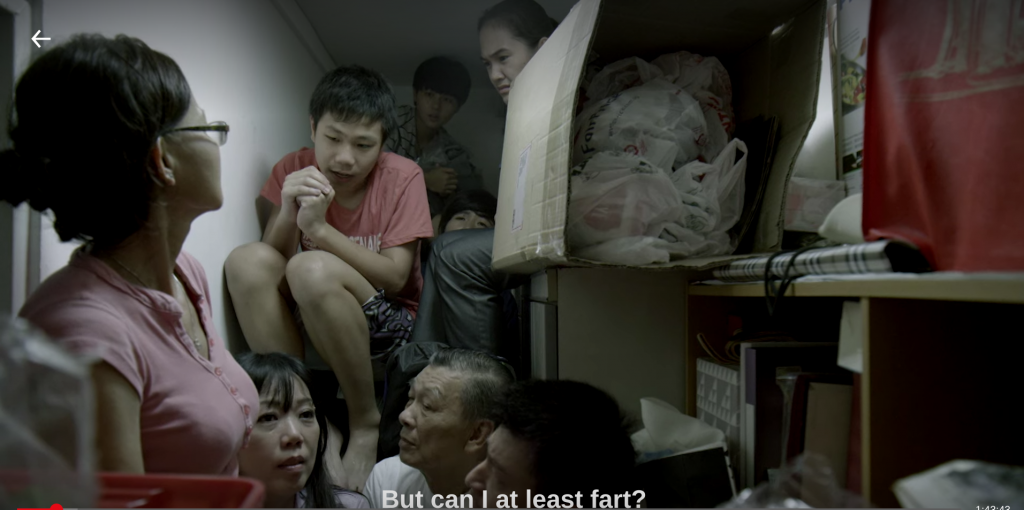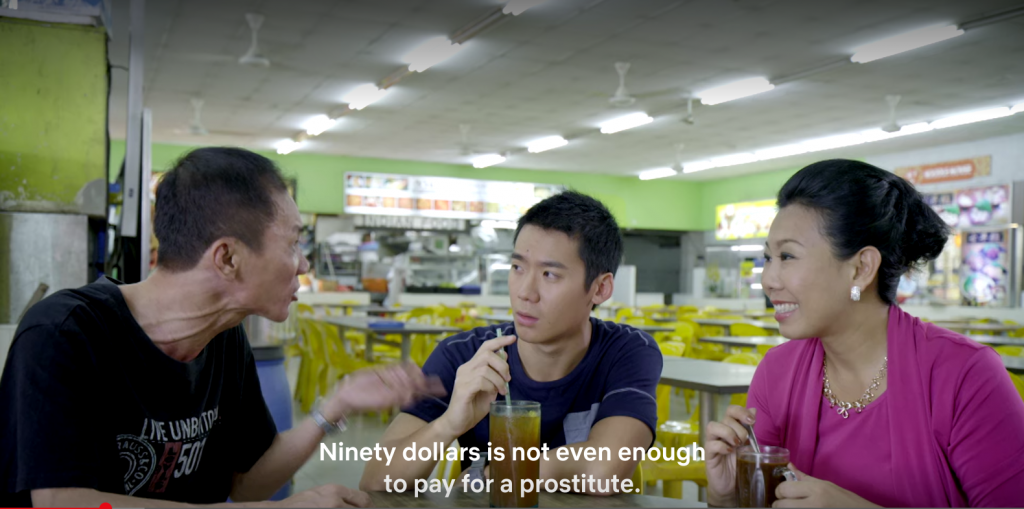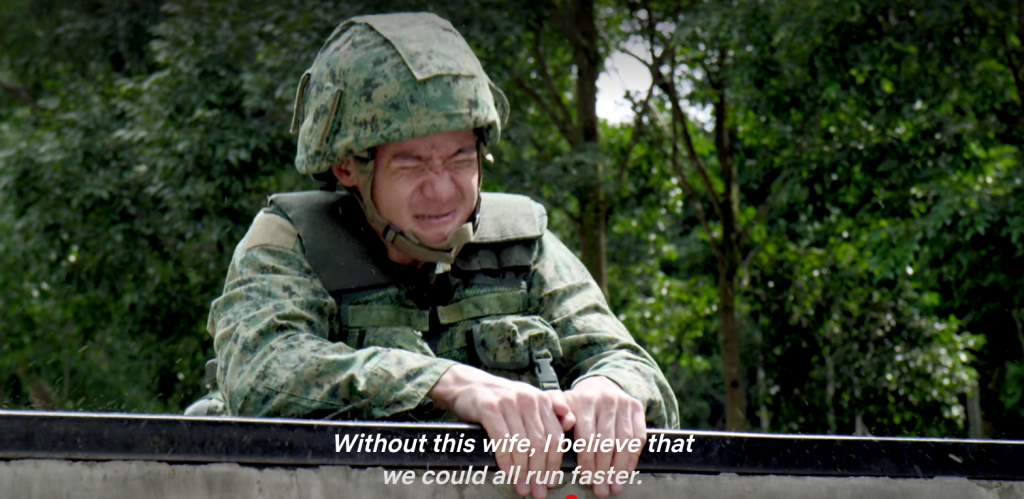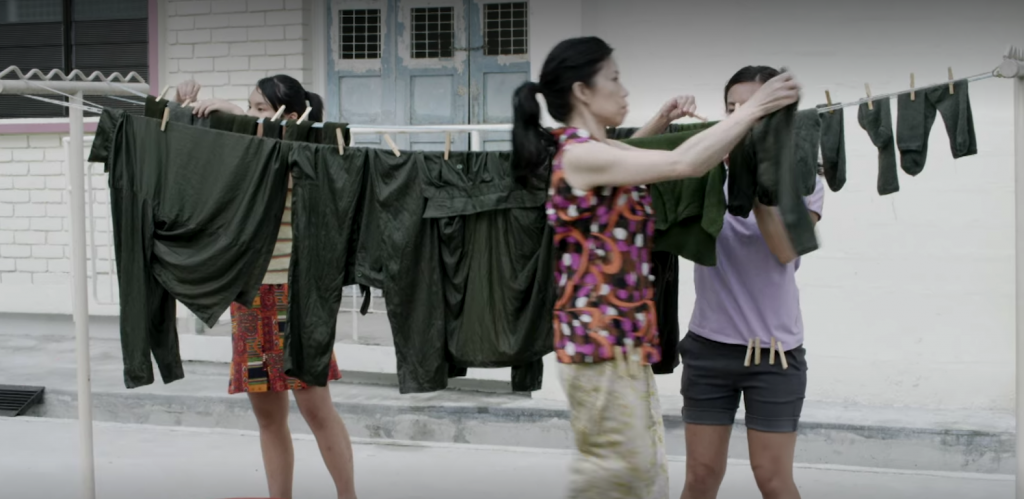All images taken from Netflix.
The consensus at RICE is that Ah Boys to Men is a terrible franchise. That its director Jack Neo is a hack who has really jumped the shark from his early decent films like Money No Enough and I Not Stupid to directing big-budget B-movies that are essentially commercials for the Singapore government and corporate brands.
Jack must be wiping away tears with money at our disapproval because the S$30MM in local box office receipts tell a different story. Every couple of years, hundreds of thousands of Singaporeans willingly part with their hard-earned cash to attend these cultural events.
If it isn’t the quality film-making that draws them in, something else must have struck a chord — enough for them to overlook the blatant MINDEF propaganda.
But debates about quality aside, all films are also time capsules. And it’s precisely this combination of government backing, corporate sponsorship, and mainstream appeal that makes the Ah Boys franchise so interesting for the armchair anthropologist (i.e. me).
When you read between the lines, the true value of this franchise is that it tells us what the powers-that-be in Singapore accepted as ‘normal’ and ‘uncontroversial’ between the years 2012 and 2017.
This is especially relevant in light of the recent proposal by AWARE chief Corinna Lim to let women serve NS, in order to address the ‘toxic masculinity’ problem in SAF.
So what I want to know is this: does Ah Boys to Men depict a problematic NS culture? Does the series actually deliver on its promise of turning boys into men? And if so, what kind of men do they turn into?
Let’s find out.
Ah Boys to Men 1 (2012): Sponsored Sexism
In 2012, Ah Boys to Men was the highest-grossing Singaporean film of all time.
It also finds Singapore’s media authorities asleep at their terminals.
Because forget the Hollywood movies depicting drug use. The opening montage to Ah Boys to Men is the biggest threat to Singapore’s national security.

Within the opening seconds, we learn that Singapore is under attack by a mysterious military force. The brain-dead responses from Singaporeans, however, is like an invitation for Singapore’s enemies to actually invade.



Watching civilians, including women and children, get gunned down or burned to a crisp with bad CGI shouldn’t be this funny, and it borders on treason that Jack Neo has managed to make the death of innocents look so corny.
But fear not, in the ultimate non-sequitur, a GAME OVER sign flashes across the screen, and we find out that the past twelve minutes was actually … a video game all along? This is a worse plot device than ‘it was all a dream.’ It’s more upsetting when you consider that a big part of the film’s S$3M budget must’ve been spent just so that Jack could go pew pew pew and make explosion noises like a 5-year old boy playing with LEGOS.
Who said there wasn’t patronage of the arts in Singapore?
But to quote HBO’s Chernobyl, “Reality is the most horrifying genre of all.”
After this Ready Player One ripoff, we are introduced to the main character Ken Chow, whose entire personality revolves around being a rich brat who really hates NS. His girlfriend is leaving to study overseas, but the patriarchy is holding him back.
In a rage, Ken stops traffic and ends by kicking over a garbage can, before being arrested by SPF. This isn’t just your run-of-the-mill rich boy fit, it’s the kind of tantrum deserving of execution by firing squad.

What follows is your standard NS enlistment process, where we are introduced to a cast of colourful characters: Lobang (the ah beng with a heart of gold), IP Man (the playboy), Aloysius Jin (aka Wayang King), as well as the Indian, Malay and PRC stereotypes who serve as comedic wallpaper for its four Chinese-Singaporean main characters.
Sounds about right.
Partway through the movie, Ken’s worst fears finally come true. His girlfriend leaves him. After the breakup scene at Benjamin Sheares bridge, she hops into the passenger seat of a mysterious Mercedes, whose owner is presumably a richer white man with a ten-inch penis, thus confirming the darkest fantasies of incels on SammyBoy and EDMW.
But by far, the worst advice on women in this movie comes from the father figures.

During training, the boys are constantly mocked for being gu niang (ladies in Chinese). Government-issued rifles are compared to wives:
“After tonight, we are all married men. This wife is a pain. She sticks to you wherever you go. You’ll be punished for mistreating her. And she has a loud voice, ‘Bang!’ You can’t say no to marriage and you can’t get a divorce. Worst thing is, you can’t even go to bed with her.”

In case you think I’m cherry-picking, I present you with the CB leaf.


Here are some other classic Boomer pearls of wisdom that cleared Singapore’s media censors in 2012:
“Women are like clothes, ready to be worn and discarded when you’ve worn them. Why must you insist on wearing this one?”
“Next time, when other guys pick her up, they’ll be like rag-and-bone men. Because she is used goods.”
If I can sum up the internal logic of this movie it would be as follow:
Younger women are possessions with sell-by dates. They have unrealistic expectations and are overly materialistic. “90% of recruit girlfriends” will confirm cheat on you (mutiny / bing-bian) when they get the chance.
Middle-aged women are shrill and naggy mother/wife figures that should not be taken seriously.
But don’t fret, women become lovable again once they become Grandma, whose only purpose in life is to spoil their grandsons and fall ill.
As for the female siblings? Forget it. Just let them do housework. The twins from The Shining had more to do than the actresses playing Ken Chow’s sisters.


Finally, the movie drags on with tedious Boomer flashbacks on how NS was so much tougher back in their day, ending on a cliffhanger after Ken’s father has a stroke/heart attack while driving to the hospital to see his shithead son.
TL;DR
Singapore in 2012 was basically an EDMW forum in real life.
Ah Boys to Men 2 (2013): Know Your Role and Shut Your Mouth
Meet the second half, the same as the first half.
In 2013, the second instalment of Ah Boys picks up where the first one left off. After his father’s accident, Ken Chow makes an about-face and is now on the straight and narrow path to OCS. Another recruit, IP Man, gets cheated on by his girlfriend. Because women, amirite?
Meanwhile, Wayang King’s wayang skills have gotten so powerful that the whole section ends up hating his guts. In a hazing incident worthy of Ngee Ann Polytechnic, they sabo him by putting a stone in his field pack during a march across Singapore.
Here, the father figures in these movies have another chance to shine. At FoodRepublic, Wayang’s father provides Wayang with more nuggets of wisdom lifted straight out of a HardwareZone message board. His advice for dealing with bullies?
The best way to fight is to not do anything.
Say what? He goes on to explain this ‘logic’ in the most convoluted way possible with, of course, yet another CGI set-piece courtesy of Jack Neo.

But maybe Wayang’s dad has a point. Later on in the film, we are introduced to the concept of being ‘marked’ by a superior officer, a practice that’s reminiscent of Jack Nicholson and A Few Good Men. Allegedly, it’s an unofficial way that superiors can punish recruits they don’t like by always volunteering them for the toughest tasks. Everyone knows it’s a punishment and yet no one can acknowledge that it exists. Since it’s off the books, there is no way of proving that this actually happens.
Which is why under these (alleged) conditions, Wayang Father’s advice of keeping your head down and avoiding the spotlight is actually a pretty good one.

TL;DR
Fall in line, soldier. Don’t be such a lil bitch and just STFU. The manliest thing you can do is keep your head down and allow problems to slowly fester beneath the surface.
The Verdict
On one hand, it’s hard to get worked up over a film franchise that’s this juvenile and pathetic. Some might even argue that I’m reading too much into a slapstick comedy.
Normally, I’d agree with you. After all, freedom of artistic expression should cover terrible artists as well. But culturally, these films become significant once you consider the context in which they were made.
While many misogynistic movies aimed at a broader audience were released in the early 2010s, only the Ah Boys franchise can boast this level of private and public support — to the point where the likes of MINDEF and other local brands had no problems slapping their logos on it.
Other movies have been banned for less. In a country like Singapore with tight restrictions on ‘controversial’ content, the fact that Ah Boys 1-2 was considered ‘normal’ is truly an indictment of the times.
Ah Boys 1 and 2 are available on Netflix.
Tell us what you thought of this story at community@ricemedia.co. And if you haven’t already, follow RICE on Instagram, Spotify, Facebook, and Telegram.







